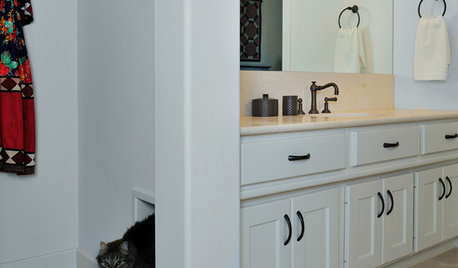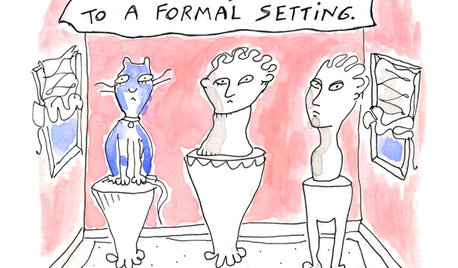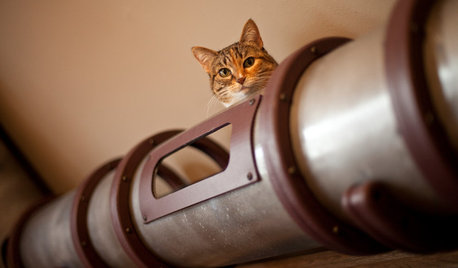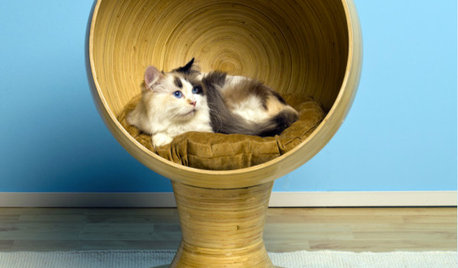very serious cat vomiting problem
I know there is a thread about cats vomiting below, but this is a different problem, NOT related to him eating too fast (he's not eating at all).
Our boy DSH cat is just over 4 years old and about 2 weeks ago began vomiting -- no food, just clear frothy liquid. He stopped eating and drinking water so we took him to the vet. He was on an IV and stayed with them for several days and they pumped him full of Reglan, Famotidine, and Flagyl (which we are still giving him in pill form).
They did a barium swallow on him to see if there were any foreign objects and about a million blood tests. All negative. After a couple of days, they told us he was eating and that we should take him home.
After getting him home, within 24 hours, he was vomiting again. He is able to eat a little bit of food every now and then, but his personality is completely different - depressed. He's also not going to the bathroom. We took him back to the vet and they did an ultrasound on him - negative again. The vet says he's never seen anything like this and says the next step is basically to use a scope and see if there's anything in there. We've already spent several grand on the above procedures and are just really disappointed that the vet keeps turning up nothing except suggestions for more expensive diagnostic procedures.
I'm worried about all these mediations we're giving our cat, especially since he's not going to the bathroom. The vet isn't really helping much, he just keeps saying he doesn't know what is going on and has to do more diagnostic procedures. Has anyone come across this before? Anyone recommend using petrolatum to help his system start moving again? We're at a loss and are really bummed out :(
Comments (28)
laurabs
16 years agolast modified: 9 years agoThose medicines are for the GI tract, so I would not stop giving him what you are supposed to. Is the cat breathing okay, or panting?
I'm sorry the vet is having trouble figuring it out. I've had a lot of that with my dogs, and it is very frustrating to feel like time and money are being wasted when what you want to be spending it on is something that will actually help the animal.
What did they do the ultrasound of?
yborgal
16 years agoHave you sprayed anything around the house? In the yard? New carpeting? Paint? Could it be a type of poison he's coming into contact with while at your home? Maybe it gets out of his system at the Vet's and then re-exposed back home.
annzgw
16 years agolast modified: 9 years agoAt this point I would ask for a referral to a veterinary internist.....and have them send all the tests results to the specialist.
I agree with mona...........I'd be very suspicious of something in the house that the cat is ingesting or is allergic to.
silvergold
16 years agolast modified: 9 years agoYour cat may have IBD or pancreatitis - either way the information I am sharing may be helpful.
Not a favorite typically because it can have side effects, but it can really save many IBD/pancreatitis cats - has the vet discussed using prednisolone/prednisone? If there is inflammation it can help stop that - also because a cat typically feels better they go back to eating.
Another thing - my IBD/pancreatitis cat used an appetite stimulant called Mirtazapine for about 4 months. The nice thing about it, is that it is only taken twice a week typically (my cat took 1/16 of a pill, typically they start at 1/8). Also, it helps to control the vomiting center in the brain.
I would not stop the medications the cat is taking without the vet recommendation. Especially the famotidine (pepcid) as it will help with vomiting.
Other special tests that may be helpful are from TAMU and many vets are not aware of these tests. I would share this link with your vet in case he is not aware of it: http://www.cvm.tamu.edu/gilab/assays/b12folate.shtml .
These are the tests:
Serum Cobalamin (Vitamin B12) and Folate - on the Feline IBD forum I am a member of, many cats are seeing dramatic changes with the addition of B12 injections. Some vets opt to do the injections without the confirming test. My own cat was tested and is not deficient - however, my vet wants to still try to do injections when he visits them in December. Injections can be done at home if you are willing to learn.TLI/PLI - to rule out pancreatitis. My cat's main symptoms are vomiting and weight loss. I would say the tests are not 100 % - as my own cat tested normal in 2005 and just slightly off this year. Yet my vet diagnosed pancreatitis via ultrasound. However, I would still recommend this for any cat suffering from GI issues as it can really help pinpoint the issue.
Regarding vomiting clear liquid - that is common for IBD/pancreatitis cats. So, I would really recommend doing these additional tests. They are non-invasive so you could do this option before doing an expensive endscopy.
He may also need repeated fluids if the vomiting continues. There may be a chance that the vet can teach you to do those at home - we managed to do this once ourselves for one of our other cats that was sick this last summer. We gave him fluids and he immediately walked in the other room and started to eat again. If cats are dehydrated, they typically will not eat.
I would also look at the food you are feeding him. Most of the people on the IBD forum recommend high protein/low carb canned foods - some feed raw. For canned food options the most frequently mentioned are Wellness, Innova, EVO, Nature's Variety Instinct, Weruva. And for those that can not tolerate fruit/veggies in their canned foods there is Avoderm Select Chunks, By Nature, and EVO has a new 95 % meat formula. My own cat is an odd one on the forum as he is eating prescription Hills I/D but he is one of the few on a prescription cat food. Many report worsening symptoms with high fiber or odd diets like Hills z/d.
I would really recommend joining the Feline IBD forum. Your symptoms are similar enough that I think they could provide you some really good information to help you get a better diagnosis. If you send me an email I can forward you a link to it. Otherwise if you do a search on Feline IBD forum you should find it.
Good luck!
Jennysilvergold
16 years agolast modified: 9 years agoAlso, I'm assuming when you say he is not going to the litter box, you are referring to bowel movement, not urine? One other thing ...I'm assuming your vet already ran a CBC (Complete Blood Count), urinalysis, and Blood Chemistry Panel? You should ask for copies of all lab work - also ask if any values were out of the norm? i.e. any white blood counts elevated, etc.
jannie
16 years agolast modified: 9 years agoExactly. Ask for a blood test,or an explanation if it's been done already.
Meghane
16 years agolast modified: 9 years agoThese are from my GI notes from school. Since your cat has chronic vomiting, I'll do them first.
First of all, vomiting is usually divided into primary GI problems and extra-GI problems (diseases of other organs that make you vomit). Here's a list of possibilities for primary GI:
Bilious vomiting syndrome: usually dogs get this; when they have an empty stomach, they vomit bile. Does not affect appetite. Cure is feed more often.
Idiopathic chronic gastritis: this means "we don't know"
Food sensitivity: must do diet trial of protein and carbohydrate sources your cat has never been exposed to before
Neoplasia: adenocarcinoma, GI lymphoma- difficult to diagnose. Gastric adenocarcinoma can sometimes be diagnosed by endoscopy and biopsy. GI lymphoma requires either endoscopy or surgical biopsy. GI lymphoma often looks like IBD without full-thickness biopsy, which is impossible to get without surgery.
Drugs- NSAIDs, corticosteroid
IBD: Also difficult to diagnose, but can be done by response to treatment (steroids- unfortunately steroids also help control signs of GI lymphoma, and once steroids are started and then you discover the lymphoma, the steroids make it much more difficult to start other chemotherapy). Can also be done by biopsy, but usually surgery is required to get full-thickness biopsy to differentiate from GI lymphoma.
GI ulcer: seen on endoscopy, treated pretty easily
Gastric FB: can be difficult to see, even with rads and ultrasound. Sometimes can only be found with exploratory surgery.Extra GI
Pancreatitis- difficult to diagnose in cats, but often can see changes to pancreas by ultrasound. Amylase and lipase not reliable in cats
Chronic renal failure: would have been seen with bloodwork as increased BUN and creatinine with low urine specific gravity
Chronic hepatopathy: ususally seen on bloodwork as increased ALKP, ALT; otherwise can see changes in appearance of liver on ultrasound
Cholecytitis: seen on ultrasound
Biliary obstruction: increased bilirubin on bloodwork; seen on ultrasound
Addisons: can be difficult to diagnose if atypical Addisons. Uncommon in cats. Must do ACTH stimulaton test.
Hyperthyroidism: easily diagnosed with T4Although less likely, here are the most common differentials for acute vomiting:
Primary GI
Overeating/gluttony- obviously not in your cat
Abrasive material- you'd probably know about this
Toxins- any houseplants he has access to? Medications? Does he go outdoors? In the garage? Had house sprayed for bugs? Any pesticides/rodenticides/other -icides anywhere that he can get to?
Food sensitivity-see above
Dietary indiscretion- some animals cannot tolerate anything other than their regular diet, but usually does not make them stop eating unless a obstructed.
Foreign body- see above
GI ulcer: can usually be seen with endoscopy, otherwise difficult to diagnose
FB- see chronic vomiting
GDV- highly unlikely in a cat, plus he'd be dead by now
Intussusception- would be dead by now
Constipation- can be seen on radiographs, clinical signs (straining to defecate), can feel hard feces in GI tract on physical examExtra GI acute vomiting
Pancreatitis- see above
Hepatobiliary- seen on bloodwork or ultrasound
Acute hepatopathy
Cholangitis
Biliary obstruction
Acute renal failure- would be seen on bloodwork same as chronic renal failure
Nephroliths- can be seen on radiographs sometimes depending on type of stone and size; otherwise seen on ultrasound
Prostatitis: can be seen as enlarged prostate on ultrasound
Pyometra: applies only to females
Peritonitis: can be seen on ultrasound as free fluid, increased brightness to peritoneal fat
Septicemia: would be evident from CBC
Addisons: see above
Hyperthyroidism: see above
Vestibular disease: would have other signs such as eyes twitching side to side (or other directions), head tilt, circling, etc.
Drugs- chemo, abxSome of the things I mentioned that can be seen on ultrasound require an experienced ultrastenographer. Even then, sometimes things are missed. The quality of radiographs plays a huge role in a veterinarian's ability to diagnose anything off of them. If the vet has a crappy X-ray machine or accepts crappy technique, then s/he has no hope of getting a diagnosis. Also sometimes the answer is there on radiographs, but it may be very subtle and missed. At school, radiographs and ultrasound images are reviewed by multiple people to reduce the likelihood of subtleties being missed; general practioners may not have that luxury. May be worth having a radiologist review the radiographs and ultrasound images or get better images if needed. I see a lot of radiographs especially made by referring veterinarians and it's no wonder they can't figure out what is going on with the patient- the images are terrible. We take the rads with our digital machine, and presto- lesion found, diagnosis made, animal (hopefully) cured.
I do agree that your cat needs some help- vomiting and not eating for 2 weeks is pretty darn serious. It's up to you and your ability to get to an internal medicine specialist whether or not you continue with your current vet or a specialist. Certainly, there are diseases which could not be diagnosed by the tests run so far, and endoscopy is a reasonable next step. Beyond endoscopy, the only other alernative is exploratory surgery, and you'd hate to do that if it can be avoided. Of course, all that assumes that the vet hasn't missed anything in all the tests run so far. If you are afraid s/he has missed something, then you may want to more strongly consider seeking the help of a specialist.
In any case, I hope your kitty gets the help he needs and starts feeling better very soon. Please keep us posted.
victoria321
16 years agolast modified: 9 years agoAre you adding a deoderant to his litterbox? We had vomiting everyday till we stopped putting A&H baking soda cat litterbox deoderant in the boxes.
patty_cakes
16 years agolast modified: 9 years agoI've had one of my two cats do this on occassion, and it could have been the A&H litter DD had bought. I don't normally buy that brand. When I got home I needed more litter and bought my regular brand, and noticed he hasn't been doing this. It's at least worth a try.
I would also change vets, even if you think yours is the best! One of my cats has stomatitis where the gums become terribly inflamed and the cat refuses to eat. Three times I took her to my regular vet, and twice he gave her Amoxicillin and on the third time a steroid, at which time told me I needed to take her to a vetinairy dentist, and she might possibly need all her teeth pulled. I did that, the the vet dentist said that's the ONLY way the stomatitis is 'delt with', of course to the tune of $3,000! I decided to take her to a vet that specializes in cats only. On one of my forums a couple of the gals said to have her tested for the Bortenella Virus. I brought this up to the vet, and she said it's very rare, but would go ahead and make the test. I got the results back yesterday, and out of 0-4 point score, my Sissy was a 3+. It's caused by a reaction to flea bites. She's an indoor cat, and I *thought* she didn't have flees. Giving her the Advantage was the first step, and she's on Zithromax until the inflamation is gone. She'll also get a good teeth cleaning, and could possibly need a few teeth extratracted because of the inflamation.
Sorry this is so long, but IMHO, seeing another vet and getting another opinion, might not be a bad idea. Good luck with getting your kitty better.
silvergold
16 years agolast modified: 9 years agoMeghane - saw your notes on pancreatitis. Did they teach you the TAMU protocols in school? I.e. Cobalamin/folate tessting or PLI/FLI for pancreatitis? Just curious.
Meghane
16 years agolast modified: 9 years agoSilvergold- yes, we did learn about TAMU's testing availabilty, and I have absolutely no idea why I didn't mention it. Good idea! Just a note, serum cobalamin and folate are not specific for pancreatitis, just small intestine disease. But the fPLI is an excellent suggestion for alissaruth's cat. That would definately save her and her cat a lot of stuff, should the fPLI be positive. Great suggestion!
Here is a link that might be useful: Texas A&M University GI Lab
silvergold
16 years agolast modified: 9 years agoThanks for the response. I'm a member of an IBD forum and the TAMU testing/B12 injections is a very hot topic. My Cougar has IBD and pancreatitis.
Meghane
16 years agolast modified: 9 years agoSilvergold- I'm sorry your Cougar has both diseases- poor baby! I hope he's doing OK with treatment.
Can you please email me information about the IBD forum? I'm really interested in this disease (well, all forms of inflammation really). Thanks.
silvergold
16 years agolast modified: 9 years agoHi meghane - I sent you an email a couple of days ago but didn't get a response back. If you are still interested, you should be able to click my link and send me an email.
ratnagiri77
16 years agolast modified: 9 years agohow is this kitty doing? my male DSH has been doing exactly the same thing since Friday afternoon. we are headed to the ER to rule out pancriatitis...
evatt
16 years agolast modified: 9 years agoallissaruth: I was just curious to know if there have been any updates with your cat...I am having the exact same problem with my cat Holly, 13...she was perfectly OK until she started vomiting so I assumed it was a fur ball but then she stopped eating and drinking...took her to the vet, blood tests and x-rays were all clean so we were sent home with subcu fluids but she didn't bounce back and a few days later she was back at the vet on an IV...the barium swallow couldn't be completed because she threw up the barium! Based on what I had read in your discussions I asked for the PLI (still awaiting results) and the Mirtazapine which isn't working, she's back at home but still won't eat or drink...the next step is the U of G vet school...by the way, I did question the age of my vets x-ray equipment and of course they were defensive...she keeps losing weight but at least she's not vomiting anymore...
susancatlover
16 years agolast modified: 9 years agoI lived in an apt. for 8 years. My 2 cats (sisters) lived there too since they were kittens. They are now 10 years old. My Mittens started throwing up white foam when I moved to a house in the country 2 years ago. I thought it was the carpet, etc. Took her to the vet, all blood tests, xrays, etc. came back fine. Shots of Reglan and she settled down. White foam again when I got 2 new kittens. Reglan shots and she settled down. This got to be expensive. So, I discussed w/my vet and attempted to give her the pills when she went through this. A challenge, to say the least, but you have to be determined to get your baby well. So, anytime something out of the ordinary happens, she starts throwing up white foam and I have to give her Reglan pills for several days before she stops. I now attribute it to stress. My 9 year old nephew came to stay with me for a week...Mittens started getting sick the next day. I have story after story of this. Wish there was something else I could do to relieve her stress, but she has always been a "scaredy cat" when people come over or people with their dogs. But now she gets so stressed she makes herself get sick. If nothing out of the ordinary happens (have gone through 2 months sick free), then she is fine. The minute someone comes over she gets sick the next day. Any experience or info. on this would be greatly appreciate. I can't bear to put her down, but it is so hard on her when she gets sick and then I can't imagine putting her down when she is better a week later.
houstonmark0_yahoo_com
15 years agolast modified: 9 years agoI've got a 7 year old Tabby that has never had a desire to go outside...ever. I've left the door open over the years to make several trips to the car to get groceries and the closest he's ever gotten was sticking his nose out the door until he saw or heard something unexpected. Having said that, a few days ago, my Dad was visiting and while I ran to the store, he opened the door to my apartment to smoke. I came back, cooked dinner, ate and then realized my cat wasn't around. I left my door open all night and the following morning he returned. He was dirty and seemed pretty irritated by it. He also looked REALLY stressed. I cleaned him up a bit (He let me wipe him down with a warm rag with a little water on it...crazy), and then went to work. Well, it's been over a week now and he hasn't been eating much, if at all and hasn't had many bowel movements. 3 days ago, he started vomiting a white frothy substance. He's done it about 3 times a day or so since then. Beyond that, he's just been an altogether different cat. He doesn't sleep on my bed anymore, doesn't go to window sills. Just lays under the bed, under a table, or behind my tv and sleeps. It's a really sad sight. I'm planning on taking him to the vet tomorrow morning...but is there anything you could recommend I do in the meantime? Anything I should ask the vet to check for if they don't do it automatically?
Thanks!
runsnwalken
15 years agolast modified: 9 years agoDid something bad happen that took away natural movement or freedom of safety- Declawing? ( its is like cutting off the tips of your fingers with a steak knife- amputation at the first didget and has lasting behavioral and physical issues) A normal 7 year old tabby should NOT act like that. though cats do become attached to territory, perhaps cat was indoors and never saw the outside.
I would try better food, for the 4 year old tabby who pukes- Instincts, Orijen, EVO may be rich but if cat is only 4 it may help Sometimes cats just throw up-our do that to though not nearly as badly, do you think its hair balls even if its so serious? it could very well be a food allergy.. Or parasites.
rebecca46
15 years agolast modified: 9 years agoMy cat vomits too, but only on an empty stomach. I had her endoscoped and she has inflammatory bowel disease. She is on prednisone now, and pepcid too when her vomiting flares up. Kind of waxes and wanes. We think her IBD was brought on by food allergies, so she now eats only Royal Canin or Prescription Diet Lamb, Duck, Venison and Rabbit. I don't like the idea of feeding her these varieties, but it has helped. I also bought a pet feeder and set it to go off during the day while I am at work and in the middle of the night, so then she can eat while I am at work and while I am sleeping. That way she doesn't have an empty stomach which can lead to vomiting that foam. All of these things have helped.
Xconsumer_hotmail_com
13 years agolast modified: 9 years agoI had similar problems with kitty. She ate then vomited for many years. She vomited frequently and often in the middle of the night. It was never so serious until a few months ago when she stopped eating entirely while under stress. After much lab work I found out she has pancreatitis, which worsens when she is under stress. She is doing exceptionally well now under her vet's care. She is now on a low fat diet into which is added pancreazyme digestive enzymes. She takes prednisolone every other day and 5mg pepcid ac every night. When there will be stress due to traveling or boarding, she takes mirtazapine which stimulates appetite and reduces stress. She is 16 now, and doing so much better & happier she is like a brand new cat!
I hope this helps someone else out there!lauren_rose_jennings_yahoo_com
13 years agolast modified: 9 years agoMy 8 year old cat is doing the very same thing as the first post. drs have no clue $$$$ later!
What ever happened to the kitty in the first post.
We are hoping that you figured out what was wrong. I dont know how long she can hold on like this.
Thanks-
LaurenJellybeang1982_yahoo_com
13 years agolast modified: 9 years agoI am going through the same thing. I went away on vacation and left my cat with my parents and their two dogs which my cat Bailey grew up with until I moved out. He often visits them when I go away. Then I took Bailey home and he started throwing up white foam. First it was once and a while, then it started picking up to 2-3 times a day. So I took the cat to the vet. They started with it being a hairball and gave me hairball lube as I call it. That made it worse. He started throwing up 6-7 times a day and stopped eating. I took him back 3 days later and they did x-rays and blood work and everything came back fine. They put him on fluids and Reglan, Carafate and Pepcid and sent him home $$$ dollars later. He was good for 3-4 days then went right back to throwing up. I was told to add gas x and baby food. The baby food made him barf just from the smell. He had an endoscopy yesteday and they found nothing visable. His biopsies were shipped to Cornell Veternary school befoe I even picked him up. (Haven't heard back yet). The doctor says that he really doesn't know whats causing it, but that once the results come back he may run lower GI testing and put him on steriods. The poor cat who had so much life in him (4 years old) all he does is sleep now. I haven't seen his eyes open since he came home. I rub him to make sure he is still with us sometimes. I really don't understand how a perfectly healthy cat gets so sick suddenly. I wish there was something more I could do while we try to figure this all out. I have to pick him up and move him to different locations. He's lost 3 lbs in a month. :(
raff_616_hotmail_com
13 years agolast modified: 9 years agomy 5 yr old cat has been having the same problem for the last 6 days. she started off by vomiting a few times a day then her appetite completely went away. no food or water. does not use the litter box...just pee. we took her to the vet they gave her x-rays...filled her with fluids for the dehydration and had all sorts of blood work done. she was at the vet for 2 days and 2 nights and still nothing. the vet told me she doesnt see anything wrong and sent us home with pills to crush in her food which shes not eating.when i try to give her the pill my self she wont open her mouth and gets very agressive.its very painful to see her in this condition.the vet asked us to see how she is during the weekend and bring her back on monday if she is still throwing up.. shes been home all day and all she does is sleep and puke. the vet bill has come up to 800$ and financially its very difficult to keep up with these insanely overpriced bills with zero results.
jillca
12 years agolast modified: 9 years agoI feel for you - my cat Mojave has had IBD/pancreatitis for over 4 years now. The symptoms you describe do fit that category. The TAMU references are good ones.
Most of his vomiting is when his stomach is empty or he is due for his B12 shot. Always make sure that your kitty has something to nibble on and stay away from dry foods - it irratates their stomachs. Yahoo has a great IBD group support forum for cats - check it out. DOn't have access to yahoo at present - just in Yahoo Groups search on "cat IBD" - it will pop upSColleenM
12 years agolast modified: 9 years agoOh my. My heart goes out to all of you.
I, too, have a cat with severe stomach upset/diarrhea, which the vet has been unable to resolve.
Kismet, my 10-year-old Maine Coon mix, had been steadily losing weight during the early part of this year. After a few adjustments to her food - during which time she seemed to rally - she began having episodes of severe diarrhea and vomiting (the vomiting always on an empty stomach).
Depo Medrol has not helped, nor has the probiotic the vet prescribed. I have discovered another probiotic formulation, however, which keeps the severity of the worst symptoms to a bearable level.
Here are her symptoms.
She is hungry nearly all the time - I feed her every few hours, and her intake is at least twice as much as the other cats in the household, yet she can't gain any weight.
She passes yellowish, soft (or liquid) stool, and vomits when she is hungry - never after she has eaten.
Despite the fact that she grooms herself, her coat is somewhat oily; and when I have attempted to cut back on - or discontinue - the probiotic, her intestines rumble loudly; her feces becomes very liquid; and she begins violent vomiting.
I am beginning to wonder if she has pancreatic insufficiency instead of pancreatitis....
judithn
12 years agolast modified: 9 years agoI was reading about cat food recalls and cats that have died from tainted food. All the people who posted their stories online had cats that vomited a lot. I don't know if it's something but you might want to check and see if you are feeding your cat one of the recalled foods. Not that it really helps, I think there are lots of foods that are probably bad for your pet but just haven't been officially recalled yet.


















jonnybignote_gmail_com